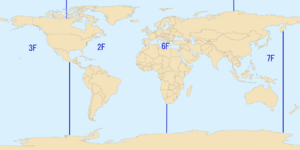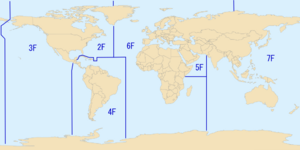United States Third Fleet facts for kids
Quick facts for kids Commander, U.S. Third Fleet |
|
|---|---|

Third Fleet Logo
|
|
| Active | 15 March 1943 – 7 October 1945
1 February 1973 – present (53 years) |
| Country | |
| Branch | |
| Type | Fleet |
| Part of | |
| Garrison/HQ | |
| Website | https://www.c3f.navy.mil/ |
| Commanders | |
| Commander | |
| Deputy Commander | |
| Chief of Staff | |
| Command Master Chief | |
| Notable commanders |
|
The United States Third Fleet is a large group of ships, submarines, and aircraft that are part of the United States Navy. This fleet is in charge of a huge area of the Pacific Ocean, covering about fifty million square miles. This includes places like the Bering Sea, Alaska, and the Aleutian Islands. This region is very important for trade and oil routes that help the economies of the United States and its friends in the Pacific.
The Third Fleet was first created in 1943. During World War II, it played a big role in fighting against Japanese forces. After the war, it was stopped in 1945. But it was brought back in 1973 and has been active ever since, taking on its current responsibilities.
Contents
What the Third Fleet Does
The Third Fleet plans and carries out naval operations in the Pacific Ocean. Its main jobs include:
- Protecting the homeland from the sea.
- Keeping the region safe.
- Helping with humanitarian efforts, like disaster relief.
They work closely with the Coast Guard and other naval forces. The Third Fleet also helps make relationships stronger between the U.S. and its allies. They do this through joint exercises and operations, such as "Rim of the Pacific" and "Pacific Partnership." These activities help train their personnel to be ready for any situation, promoting peace or handling conflicts.
The Third Fleet is a powerful force. It has many ships, submarines, and aircraft. These are based in California, Washington, and Hawaii. The fleet includes:
- Five aircraft carrier strike groups. Each group has cruisers, destroyers, and frigates.
- Over 30 submarines.
- About a dozen supply ships to support the other vessels.
The Third Fleet's air force has more than 400 Navy aircraft. These include Boeing F/A-18 Super Hornets, Northrop Grumman E-2C Hawkeyes, and various helicopters like the Sikorsky SH-60 Seahawk.
History of the Third Fleet
World War II Operations
The Third Fleet was first formed on March 15, 1943. It was led by Admiral William F. Halsey. Its main office on land was set up in Pearl Harbor, Hawaii, in June 1944.
The ships of the Third Fleet were also used to form the Fifth Fleet. This happened in April 1944. Admirals Halsey and Raymond A. Spruance would take turns leading the fleet for big operations. This allowed one admiral to plan while the other was in command. It also confused the Japanese, making them think there were two separate fleets.
When it was called the Third Fleet, it operated in many important areas. These included the Solomon Islands, the Philippines, and near Japan. Its main ship was first the battleship USS New Jersey. Later, from May 1945, it was the battleship USS Missouri.
The Third Fleet took part in major battles like the Palau Islands campaign and the Philippines campaign. It also fought in the Battle of Leyte Gulf in October 1944. The fleet faced strong typhoons, like Typhoon Cobra in December 1944. In the summer of 1945, it launched air attacks on Japanese cities and naval bases.
The British Pacific Fleet also worked with the Third Fleet towards the end of World War II. They were part of Task Force 37 under the Third Fleet's command.
The war ended before the Third Fleet had to take part in a planned invasion of Japan. On August 29, 1945, Admiral Halsey led the Third Fleet into Tokyo Bay. The official surrender documents ending the war were signed on the deck of the USS Missouri on September 2, 1945. The Third Fleet stayed in Japan for a short time. Then, its ships returned to the United States West Coast. On October 7, 1945, the Third Fleet was put into reserve and stopped active duty.
Re-establishing the Fleet
On February 1, 1973, the Third Fleet was brought back into active service. It took over the duties of the former First Fleet. Its new job was to train naval forces for missions overseas. It also tested new technology for the fleet. The Third Fleet could also be sent into action if a major conflict happened.
In 1986, the Third Fleet commander moved his base from land to a ship, the USS Coronado. This was the first time since World War II that the commander was based on a ship. In 1991, the Third Fleet's command ship and staff moved to San Diego. In 2003, the commander moved back to a land-based headquarters in San Diego.
In 2010, the USS Ronald Reagan and other Third Fleet ships took part in a big naval review. This event celebrated the 100th birthday of the Royal Canadian Navy. Many ships and sailors from different countries joined this review.
In 2015, Nora Tyson became the commander of the Third Fleet. She was the first woman to lead a numbered fleet in the U.S. Navy.
Current Operations
The Third Fleet's main goal is to prevent conflicts. But if a major war starts, it is ready to fight at sea. These operations would happen early in a conflict. Their main wartime job is to defend the western sea areas of the United States, including Alaska.
The Third Fleet constantly trains Navy and U.S. Marine Corps forces. This training prepares them for missions around the world. All training is done together with other military branches. This makes sure that forces are ready to work as one team under a joint command.
The commander of the Third Fleet can also lead a Joint Task Force (JTF). This means they can be in charge of U.S. forces sent to respond to a specific event. For example, if there's a big disaster or a security issue.
The Third Fleet is also expanding its ability to operate further into the Western Pacific. This is an area usually managed by the Seventh Fleet. This "3rd Fleet Forward" idea helps the Seventh Fleet focus on other important areas, like potential issues near the Korean Peninsula. This way, the Third Fleet can quickly respond to other situations in the Pacific. These could include humanitarian disasters or maritime security issues in places like the South China Sea.
In April 2016, Vice Admiral Tyson sent three warships (USS Momsen, USS Spruance, and USS Decatur (DDG-73)) to the Western Pacific. One of these ships, the USS Decatur, sailed near the Paracel Islands. These islands are claimed by several countries. The ships remained under Third Fleet command during this operation.
Fleet Units
The U.S. Third Fleet includes several important units:
- Carrier Strike Group One
- Carrier Strike Group Three
- Carrier Strike Group Nine
- Carrier Strike Group Eleven
- Expeditionary Strike Group Three
- Naval Surface Group Mid-Pacific
- Littoral Combat Ship Squadron One
- Helicopter Maritime Strike Wing
- Commander, Strike Force Training Pacific
- Explosive Ordnance Disposal Group One
- Coastal Riverine Group One
- Navy Air and Missile Defense Command
- Naval Mine and Anti-Submarine Warfare Command
- Submarine and Theater Anti-Submarine Warfare Force Third Fleet
Fleet Task Forces
| Task Force Name | What it Does | Location/Notes |
|---|---|---|
| CTF-30 | Battle force | N/A |
| Task Force 31 | Command and Coordination Force | |
| CTF-32 | Ready Force | |
| CTF-33 | Logistics support force | Point Loma. Helps deliver fuel, supplies, and other services to Navy ships. |
| CTF-34 | Anti-Submarine Warfare force | Pearl Harbor, HI |
| CTF-35 | Surface combatant force | |
| CTF-36 | Amphibious force | |
| CTF-37 | Carrier strike force | |
| CTF-39 | Landing force |
Images for kids
See also
 In Spanish: Tercera Flota de los Estados Unidos para niños
In Spanish: Tercera Flota de los Estados Unidos para niños
 | Valerie Thomas |
 | Frederick McKinley Jones |
 | George Edward Alcorn Jr. |
 | Thomas Mensah |





















